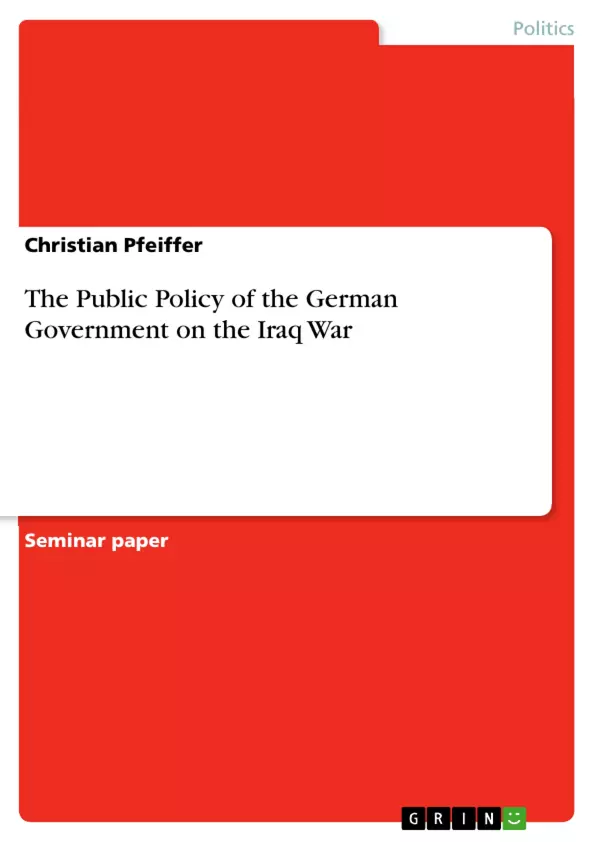Introduction
In his campaign for the elections of the German federal parliament Bundestag in October 2002, Bundeskanzler Gerhard Schröder turned in public against a war with the Saddam Hussein regime in Iraq. He refused sending troops to the Middle East in case of an attack through an international alliance, led by the United States of America. Together with the president of France, Jacques Chirac, he tried to convince the countries of the world, not to participate in such a war. Both countries wanted to form an alliance ag ainst the politics of US -president George W. Bush.
This research paper examines the public policy of the Germ an federal government concerning the Iraq cris is from August 2002 to March 2003. Therefore it will app ly the theories studied in the Vesalius College co urse “Com parative European Public Policy Analysis”. In the first step the research paper describes very detailed the circumstances under which the policy was deve loped, what it contained and how it changed. It is looking at the time frame, involved institutions and the target groups of the policy. After this com prehensive outline of the public policy the research papers exam ines every aspect of it using the Policy Cycle Approach from the book Studying Public Policy of Michael Howlett and Michael Ramesh.
To reconstruct the policy of the Germ an gove rnment the author uses especially articles published in the media, because there are no monographies published already on this topic.
Inhaltsverzeichnis (Table of Contents)
- Introduction
- Policy Description
- The Policy Cycle Theory
- Agenda Setting
- Policy Formulation
- Decision Making
- Policy Implementation
- Evaluation
- Conclusion
Zielsetzung und Themenschwerpunkte (Objectives and Key Themes)
This research paper examines the public policy of the German federal government concerning the Iraq crisis from August 2002 to March 2003. It applies the theories studied in the Vesalius College course "Comparative European Public Policy Analysis" to analyze the policy's development, content, and changes.
- The development and evolution of the German government's policy on the Iraq crisis
- The application of the Policy Cycle Theory to understand the German government's policy
- The impact of the Iraq crisis on German-US relations
- The influence of the Political Business Cycle on the German government's policy
- The role of media and public opinion in shaping the German government's policy
Zusammenfassung der Kapitel (Chapter Summaries)
The introduction presents the context of the German government's policy on the Iraq war, highlighting the role of the German Chancellor, Gerhard Schröder, in opposing military intervention. It outlines the research paper's scope and methodology, including the use of the Policy Cycle Approach.
Chapter 1 provides a detailed description of the German government's policy on the Iraq crisis. It examines the policy's development, content, and changes over time, considering the timeframe, involved institutions, and target groups. It also discusses the influence of media coverage on public opinion and the German government's policy stance.
Chapter 2 examines the German government's policy using the Policy Cycle Approach, analyzing each stage of the policy cycle—agenda setting, policy formulation, decision making, policy implementation, and evaluation. This chapter explores the political dynamics, key actors, and decision-making processes involved in the policy's development.
Schlüsselwörter (Keywords)
The key terms and focus topics of this research paper include the Iraq crisis, German public policy, the Policy Cycle Theory, agenda setting, policy formulation, decision making, policy implementation, evaluation, German-US relations, the Political Business Cycle, and media influence.
Frequently Asked Questions
What was the German government's stance on the Iraq War in 2002?
Chancellor Gerhard Schröder publicly opposed the war, refusing to send troops even as part of an international alliance led by the United States.
How did the Iraq crisis affect German-US relations?
The crisis led to significant tensions between Germany and the US, as Germany, along with France, tried to form an alliance against the interventionist politics of President George W. Bush.
What is the "Policy Cycle Approach" used in this research?
It is a theory that analyzes public policy through stages: Agenda Setting, Policy Formulation, Decision Making, Policy Implementation, and Evaluation.
What role did the 2002 federal elections play in this policy?
The research examines the "Political Business Cycle," suggesting that Schröder's anti-war stance was a successful campaign strategy to secure re-election.
Which institutions were involved in developing the German Iraq policy?
Key institutions included the Federal Chancellery, the Foreign Office, and the German Bundestag, influenced heavily by public opinion and media coverage.
Why did the author use media articles as primary sources?
At the time of writing, few academic monographs had been published on this recent event, making media reports the most detailed available record of the policy's evolution.
- Citation du texte
- Christian Pfeiffer (Auteur), 2005, The Public Policy of the German Government on the Iraq War, Munich, GRIN Verlag, https://www.grin.com/document/38170



